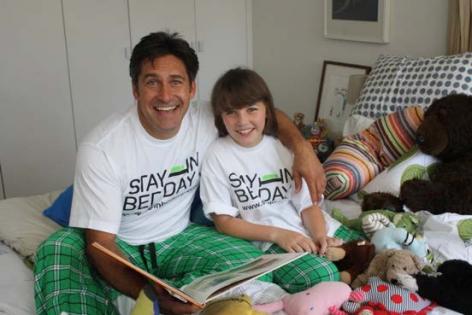Embrace the chilly weather and stay snuggled up in your winter woollies this Sunday to help raise vital funds for the Australian Mitochondrial Disease Foundation’s (AMDF) annual awareness and fundraising event, National Stay in Bed Day.
Celebrity ambassadors including Jamie Durie (pictured) and Kate Ritchie will be having a guilt-freelie-in wearing their Stay in Bed Day PJs to support the thousands of adults and children living with the debilitating and potentially fatal genetic disorder mitochondrial disease (“mito”), which has few effective treatments and no cure.
Needing to stay in bed to rest and recharge is a common outward symptom of mito – a complex disease that robs major organs and muscles of the energy they require to function properly - making Stay in Bed Day an apt and easy way for everyone to get involved and support sufferers.
Depending on which parts of their bodies are affected and to what extent, people with mito can lose their sight or hearing, be unable to walk, eat or talk normally, have strokes or seizures, or develop heart problems, liver disease, diabetes, or respiratory or digestive problems.
Jamie Durie says: “My life has been touched by mito through a close friend’s daughter. I have seen first hand the impact it has on this little girl physically and mentally, plus the flow-on effect to the entire family. It’s a truly devastating situation and that’s why I’m urging all Aussies to resist the urge to get up on a chilly Sunday June morning and stay put, so we can beat this insidious disease.”
Kate Ritchie adds: “Last year I learnt a lot about mito thanks to my trip back to Summer Bay and the Home & Away storyline which saw my character Sally Fletcher’s daughter affected by it. I had not previously heard of this devastating
disease but what I did know is that all parents hope for happy and healthy children, something that they deserve. I can only imagine how they must feel when faced with this diagnosis. Let's show them our support and get behind Stay in Bed Day – it’s a rare occasion when doing nothing can make a really big difference!”
It’s easy for everyone to participate in Stay in Bed Day on Sunday 29 June. For example:
- Give a Sleep-In to yourself or loved ones! Donate at http://www.stayinbedday.org.au to receive a Stay in Bed Day Do Not Disturb door hanger, ensuring an extra hour in bed guilt free or an indulgent all-morning lie-in. Sleep-ins can be bought any time: the perfect feel-good gift!
- Be sponsored to stay in bed. It takes just a few minutes to register at the Stay in Bed Day website; then contact family, friends and colleagues to ask for their support.
- Donate or sponsor others to sleep in. Search for Stay in Bed Day supporters – including many mito sufferers – at www.stayinbedday.org.au.
- Host a pyjama party, a John & Yoko-style bed-in, breakfast in bed, or even a relay-style bed-to-bed event. Ask bed-mates to donate or buy a sleep-in voucher to join in.
Australian Mitochondrial Disease Foundation CEO Sean Murray, whose family is affected by mito, says that in addition to raising funds, National Stay in Bed Day is about making the public and doctors more aware of the symptoms of mito to ensure proper diagnosis and healthcare.
“Many people with the genetic mutations implicated in mito are symptomatic but undiagnosed or misdiagnosed, some are not yet symptomatic, and others are unknowingly at risk of passing the disease on to their unborn children,” Mr Murray said.
“One Australian child born each week – 50 children every year – will develop a severe or life-threateningform of mitochondrial disease and half will die in childhood, making mito the second most commonly diagnosed serious genetic disease after cystic fibrosis.
“A further 20 Australian children born each week are at risk for developing a mild or moderately disabling form of mitochondrial disease. These are shocking statistics that highlight why fundraising initiatives like Stay in Bed Day are so important to our mito community.”
The AMDF does not receive government funding and relies solely on donations. Thanks to public support, the AMDF has funded major research projects, an Australia-wide mitochondrial patient database and priority access to a new Next-Generation DNA Sequencing Facility to enable faster, less expensive and more accurate diagnoses of mitochondrial disease.
The AMDF also operates a telephone helpline and website, has local support groups including a Facebook group, and runs information sessions for patients, GPs and specialists.


















__small.png)










